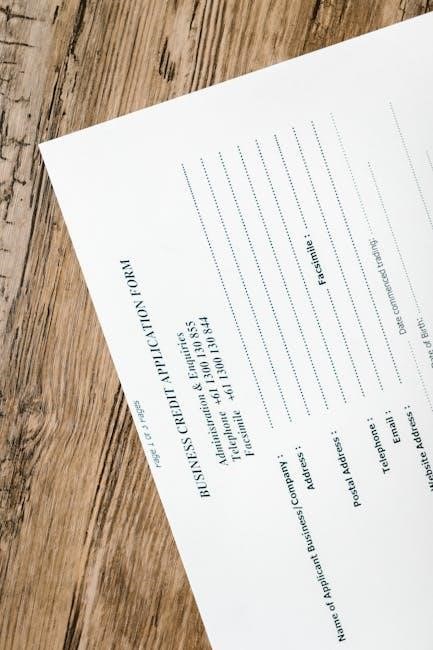IRS Form 8846 is used by employers to claim a tax credit for Social Security and Medicare taxes paid on employee tips․ It helps reduce tax liabilities for food and beverage establishments, ensuring compliance with federal tax regulations while providing financial relief to eligible businesses․
1․1 Overview of Form 8846
IRS Form 8846, Credit for Employer Social Security and Medicare Taxes Paid on Certain Employee Tips, is a tax form designed for specific employers to claim a nonrefundable tax credit․ It applies primarily to food and beverage establishments, such as restaurants and bars, where employees receive tips․ The form allows employers to reduce their tax liability by offsetting Social Security and Medicare taxes paid on employee tips․ It is a straightforward document with six lines, requiring accurate tip reporting to ensure compliance and maximize benefits․
1․2 Purpose of the Form
IRS Form 8846 is specifically designed to allow eligible employers to claim a tax credit for Social Security and Medicare taxes paid on certain employee tips․ Its primary purpose is to provide financial relief to businesses, particularly in the food and beverage industry, by reducing their tax liability; By reporting tip-related taxes accurately, employers can ensure compliance with federal tax laws while benefiting from this tax credit opportunity․

Eligibility Criteria for Claiming the Credit
Employers in food and beverage industries with employees receiving tips from customers for services like food delivery or serving are eligible to claim this credit․
2․1 Who Can File Form 8846?
Employers in food and beverage industries, such as restaurants, bars, or catering services, can file Form 8846 if their employees receive tips from customers for services like food delivery, serving, or related activities․ This form is specifically designed for employers who pay Social Security and Medicare taxes on employee tips and wish to claim a tax credit to reduce their tax liability․
2․2 Conditions for Claiming the FICA Tip Credit
To claim the FICA tip credit, employers must have employees who received tips from customers for services like food delivery, serving, or related activities․ The employer must have paid Social Security and Medicare taxes on these tips․ Additionally, employees must accurately report their tips, and the employer must meet the minimum wage requirements using tip income․ The credit is limited to the employer’s portion of taxes paid on reported tips, ensuring compliance with IRS regulations․

Calculating the FICA Tip Credit
The FICA tip credit calculation involves determining the employer’s portion of Social Security and Medicare taxes paid on employee tips․ It applies to food and beverage businesses, ensuring accurate reporting and compliance with tax regulations․
3․1 Steps to Calculate the Credit
To calculate the FICA tip credit, start by determining the total tips reported by employees․ Subtract non-tip wages and apply the minimum wage adjustment to ensure compliance with federal standards․ Multiply the resulting amount by the employer’s tax rate for Social Security and Medicare․ Ensure the credit does not exceed the employer’s total tax liability․ Accurate employee tip reporting is crucial for correct calculations and to avoid penalties․ This step-by-step approach simplifies the process, ensuring employers maximize their tax benefits effectively․

3․2 Required Information for Calculations
To calculate the FICA tip credit, gather total tips reported by employees, their hourly wages, and the number of hours worked․ Ensure accurate reporting of tips and wages to avoid penalties․ Additionally, track the federal minimum wage rate and any adjustments made to meet it․ Proper documentation, including payroll records and tip tracking, is essential for compliance and accurate credit calculations․ This information ensures employers can correctly determine their eligibility and claim the maximum allowable credit․

Completing IRS Form 8846
Form 8846 is straightforward, requiring total tips reported, wages paid, and hours worked․ Accurate employee tip reporting is crucial to avoid penalties and ensure compliance․
4․1 Line-by-Line Instructions
Start by entering your employer’s name and EIN at the top․ Line 1 requires the total tips reported by employees․ Line 2 is for total wages paid, excluding tips․ Line 3 asks for total hours worked by employees who received tips․ Line 4 calculates the minimum wage adjustment, ensuring compliance with federal wage standards․ Line 5 shows the credit amount, derived from the previous calculations․ Ensure all data is accurate to avoid penalties and ensure proper credit eligibility․
4․2 Common Mistakes to Avoid
- Ensure accurate reporting of employee tips to avoid discrepancies․
- Double-check calculations for Social Security and Medicare taxes․
- Verify that all required fields are completed, including employer details and tip-related data․
- Avoid miscalculating the minimum wage adjustment, as this can lead to incorrect credit amounts․
- Ensure compliance with federal wage standards to prevent penalties․
- Keep detailed records of employee tips and wages for audit purposes․

Submitting the Form
Submit Form 8846 electronically or by mail, attaching a signed copy to your tax return․ Ensure timely filing to avoid penalties and ensure compliance with IRS requirements․
5․1 How to File Form 8846
To file Form 8846, employers can submit it electronically through the IRS e-file system or by mail․ Electronic filing requires a signed Form 8846 with a PIN․ For mail, attach the signed form to your tax return and send it to the address listed in the IRS instructions․ Ensure the form is completed accurately and submitted on time to avoid penalties․ Keep a copy for your records and verify the mailing address based on your location․
5․2 Deadline and Penalties
The deadline for filing Form 8846 is typically April 15th of each year, unless extended․ Late filing may result in penalties and interest on unpaid taxes․ Employers must ensure timely submission to avoid additional costs․ The IRS imposes penalties for late or inaccurate filings, which can increase over time․ Filing by the deadline is crucial to maintain compliance and avoid financial repercussions․ Always verify the deadline based on the tax year and file accurately to prevent penalties․

Frequently Asked Questions
IRS Form 8846 addresses frequently asked questions about claiming the FICA tip credit, eligibility, and proper filing procedures for food and beverage employers․
6․1 General FAQs About Form 8846
Form 8846 is used by employers in the food and beverage industry to claim a tax credit for Social Security and Medicare taxes paid on employee tips․ Eligible employers must have employees who received tips for services like food delivery or serving․ The form requires accurate reporting of tips and wages to calculate the credit․ It helps reduce tax liabilities and ensures compliance with federal tax laws; Employers must file it annually to avail the benefit․
6․2 Troubleshooting Common Issues
Common issues with Form 8846 include inaccurate tip reporting by employees, which can delay credit calculations․ Employers must ensure all tip data is precise to avoid penalties․ If the form is incomplete or contains errors, the IRS may reject it, requiring resubmission․ Understanding the minimum wage adjustment is crucial to avoid miscalculations․ For unresolved issues, consulting IRS guidelines or a tax professional is recommended to ensure compliance and accurate filing․

Best Practices for Employers
Accurate tip reporting, regular audits, and clear communication with employees are essential․ Maintain detailed records and consult professionals to ensure compliance and maximize tax benefits․

7․1 Ensuring Compliance
To ensure compliance, employers must accurately track employee tips and verify reports․ Regularly review tip records, implement training programs, and stay updated on IRS regulations․ Maintain detailed documentation, including tip receipts and payroll records, to support credit claims․ Monitor compliance with federal and state laws, and address discrepancies promptly․ Failure to comply may result in penalties or loss of the FICA tip credit․ Consulting a tax professional can help navigate complex requirements and ensure adherence to all guidelines․
7․2 Record-Keeping Tips
Accurate record-keeping is essential for claiming the FICA tip credit․ Maintain detailed records of employee tips, including receipts and payroll reports․ Create a centralized system to track tips and ensure employees report them accurately․ Regularly audit records to identify discrepancies and address them promptly․ Store digital backups of all documentation to prevent loss․ Retain records for at least four years, as required by IRS guidelines․ This ensures compliance and supports your credit claims during audits or reviews․
IRS Form 8846 simplifies tax savings for employers by allowing credits on Social Security and Medicare taxes paid on employee tips, promoting compliance and financial efficiency․
8․1 Final Thoughts on Form 8846
IRS Form 8846 is a valuable tool for employers to reduce tax liabilities by claiming credits on Social Security and Medicare taxes paid on employee tips․ Primarily benefiting food and beverage establishments, it ensures compliance while offering financial relief․ Accurate reporting and adherence to IRS guidelines are essential to maximize benefits and avoid penalties․ Understanding the form’s requirements and properly documenting tip income are key to unlocking its full potential for eligible businesses․

8․2 Importance of Accurate Filing
Accurate filing of IRS Form 8846 is crucial to ensure compliance with tax regulations and avoid penalties․ Errors or omissions can delay processing, reduce the credit amount, or trigger audits․ Employers must carefully report tip income, calculate credits correctly, and maintain detailed records․ Precise filing not only secures the maximum allowable credit but also builds trust with the IRS, preventing legal or financial complications․ It is essential to double-check all entries before submission to ensure everything is accurate and complete․
